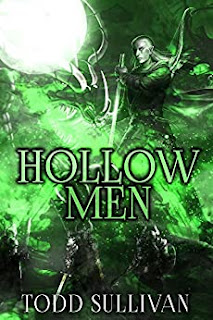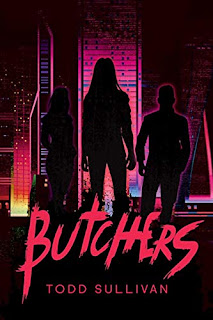The Sneakiness of Space
By Todd Sullivan
So is it fulfilling?
This is the question all writers have to ask themselves as they struggle to get their voices heard. When you’re a child, you dream of being an author before understanding what it is to be an adult. For my generation, born in the late 70s, growing up in the 80s, a teenager in the 90s, being a writer was a more realistic dream. This was before the internet when cable television was an expensive summer luxury and satellite T.V. was an exciting new technology beyond the affordability of most families. We didn’t have access to the World Wide Web, 100s of television channels, and 24-hour news cycles.
When I was young, being an author meant you were someone who wrote books. Period. What did I know of the lifestyles of Roald Dahl or Madeleine L’Engle? Were they rich or upper-middle-class? Did they live in mansions, dine at 5-star restaurants, wear designer clothes, travel to exciting and exotic locales around the world?
I can’t remember seeing a single interview of my favorite authors in the 80s and 90s. Sure, maybe they’d occasionally show up on Sesame Street, NPR, or answer questions in a national newspaper or magazine. But in my childhood, we knew the books, not the authors. When we dreamed of success, we dreamed of just that: words written and enjoyed by readers.
In those days, it was easier to be fulfilled as a writer. If you got something published, you assumed people were going to read it. Analytics and algorithms were reserved for math and science class. An acceptance letter was a time of celebration, especially if the publication featuring your work was located in the public library or bookstore. You’d get your check, a contributor’s copy, and voila! you had fulfilled your childhood dream. Who thought about fame when authors, like most people in those times, existed in obscurity? You didn’t expect the world to know, or want to know, about the minutiae of your daily life. Maybe one day you’d have a biography written about you which would never sell as much or be as beloved as the words you wrote.
The internet and plentitude of information pathways have changed all of that. A window has been opened onto the lives of a very small percentage of internationally known authors, and writers can’t help but compare themselves and be compared by others, to that 1% of the very wealthy and famous of world’s society.
Think about that for a second. How many people do you meet as a writer who genuinely expects you to reach some socioeconomic heights that they themselves, or anyone they know, ever come close to, and honestly have no realistic expectation, of achieving?
As a result of these unreasonable expectations, writers today desire millions of followers on Twitter, invitations to opine on news shows and popular podcasts, have their writing published in the most prestigious markets with huge subscription bases that pay equally impressive checks, get offers to turn their books into Hollywood movies or dramas on Netflix. Writers today are in serious competition with the top 1% of their field, a race that’s only a phenomenon in the art world. Every day on social media, you witness the angst and frustration of these competitors because not only do they not reach those atmospheric stratums, but many realize they never will no matter how much they wish to.
So is being a writer fulfilling?
I think part of the problem with answering the question is not knowing what it feels like. Would it be happiness, which is often fleeting anyway? Contentment would be nice, though for the lifelong pursuit put into the endeavour of being a writer, feeling nice doesn’t seem nearly a sufficient enough emotional reward.
Perhaps self-fulfillment is one of those states of awareness that sneaks up on you over time. You come to know its presence when weeks have become months, and you look back upon a period of years and realize that you’ve felt engaged in the reality you’ve been living. Engaged in your daily activities, engaged with the people you’ve been interacting with, and the work you’ve been doing 40+ hours a week.
When the life of a writer feels like you actually fit within the space that you’re existing in, you may be able to answer the question with, “Yes, this world of words is fulfilling.”
In a world of swords and sorcery, illusionist Kim Nam-Gi has a dream: to become a hero.
by Todd Sullivan
October 1, 2021
Genre: young adult, sword and sorcery, dark fantasy
Born in the land of South Hanguk, cursed with a malformed spine, Nam-Gi longs to prove his worth against dragons and monsters. Instead, he toils in his family’s restaurant while studying advanced spells under the tutelage of a Dark Elf.
When his father, Kim Joo-Won, goes deep into debt in an attempt to attract new customers to their struggling restaurant, Nam-Gi is once again denied permission to put his name forward on the governor’s registry. Joo-Won needs him for the restaurant, and a greedy money lender hovers over them with the aim to keep the Kim family in perpetual debt.
Desperate to solve their financial woes, Nam-Gi uses magic to trick customers into believing that the restaurant’s meager bottom feeders are actually carp and abalone. If he can keep up the deception, his family might prosper enough to escape the lender. Then his father may grant him permission to abandon his post at the restaurant and take the challenge of a quest.
A perfect opportunity soon arrives. On the other side of South Hanguk, two fishermen discover a corpse with strange leathery wings drifting in the sea. They haul the body back to the village. Tragedy ensues when their unexpected catch proves to be more terrifying than anything they could have imagined.
The governors of South Hanguk seek out adventurers who can slay the monster that now terrorizes the besieged fisherfolk. Will Nam-Gi be allowed to roam across wild lands and wander through dark forests to vanquish this threat? Can he push his crippled body beyond the limits that have plagued him since birth?
Find out in BLOOD STEW, the tale of a disabled teen who must face overwhelming odds in his quest to become a hero.
About the Author:
Todd Sullivan currently lives in Seoul, South Korea, where he teaches English as a Second Language. He has had more than two dozen short stories, poems, essays, and novelettes published across five countries. He currently has two book series through indie publishers in America. He writes for a web and play series in Taipei. He founded the online magazine, Samjoko, in 2021, and hosts a YouTube Channel that interviews writers across the publishing spectrum.









I agree. In the past we knew only the books and not the authors. I love being able to read posts like this and get to know the author behind the stories.
ReplyDeleteBlood Stew: The Windshine Chronicles is the first in a series of four novels by Todd Sullivan. It is a very good read and I am looking forward to reading the next book in the series. I'm currently writing academic papers for 3hoursessay company, but I already have the outline and want to publish my fantasy book.
ReplyDelete